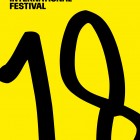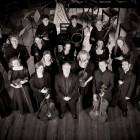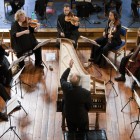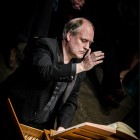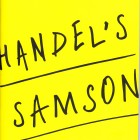Samson 2018Edinburgh International Festival
Read more about the opera Samson
The operatic offering at the 2018 Edinburgh International Festival consisted of three fully staged productions imported from leading French companies. There were also two concert performances.
In recent years we have heard several of Rossini's less frequently performed operas. Now we could see, together for the first time here, his two most popular comic masterpieces. The Barber of Seville was presented by Le Théâtre des Champs-Elysées, on their first visit from Paris and Cenerentola by the familiar and welcome Opéra de Lyon.
In addition, John Gay's Beggar's Opera was performed by the Théâtre des Bouffes du Nord, from Paris, who had a substantial residency at the Festival. William Christie led the musical side of this multinational coproduction.
The third instalment of Wagner's Ring, Siegfried was performed in the Usher Hall. Sir Mark Elder conducted the Hallé; the all-star cast included Simon O'Neill (Siegfried), Christine Goerke (Brünnhilde) and Iain Paterson (Wanderer).
Continuing the creepy forest theme, there was also a concert performance of Humperdinck's Hansel and Gretel, given by the RSNO under Sir Andrew Davis. Elizabeth DeShong (Hansel) and Laura Wilde (Gretel) led the cast.
Two important oratorios were also given in the Usher Hall. The Dunedin Consort performed Handel's mighty Samson and the Festival's opening concert was Haydn's Creation.
Samson is widely recognised as one of the greatest of Handel's oratorios, also one of the most operatic. Indeed it is a work that has functioned well in a staged dramatic form at Covent Garden, though it has not been seen that way in Scotland. Here it was safe in the hands of John Butt and his wonderful Dunedin Consort, who have built an excellent reputation in the performance of many kinds of baroque repertoire, Monteverdi and Bach to Blow, Purcell and Handel. While they have in the past done smaller-scale dramatic Handel pieces such as Acis and Galatea and Esther, this was their first encounter with one of the great post-operatic oratorios apart from Messiah.
It was a complete success, greeted first with intense concentration then huge delight by the audience, and should encourage the Festival management to invite the same artists back on a regular basis for a series of these works. At the start there was only one area of doubt, which sprang from the apparently surprising platform layout. The orchestra (nearly 30 players) were to the left with the choir of two dozen to the right, closer to the front of the stage than usual. If issues of balance were expected they simply did not materialise - perhaps due to John Butt's skilful direction. The sense of commitment from all was total.
The work itself is derived from Milton's great Samson Agonistes, which takes as its model the classical tragedies of antiquity. Samson, already blinded and in prison, contemplates his coming end, while he is visited in turn by his friend, his father, his apparently repentant wife and a leading Philistine warrior. Offstage events such as the final catastrophe are communicated by messenger. It is a static piece, but there is never any risk of boredom setting in. One after the other there is a sequence of moving solos for which a superb team of singers had been assembled. In employing the 1743 version, the evening became longer than usual, but the quality of performance ensured that attention did not wander.
Highlights included 'Total Eclipse' as Samson's realisation of his blindness hits home. This was given the expected moving reading by the sweet-toned young American tenor Paul Appleby. He was a more vehement vocalist in the scene with Dalila as recriminations fly and she reveals her true character. Samson's final utterances as he resolves to die take the form of another wonderful slow air, 'Thus when the sun', and this was given a beautiful delivery.
Dalila's scene includes a more familiar air, 'With plaintive notes', with superbly executed warbling woodwind accompaniment. Sophie Bevan's delivery of this was wonderfully limpid. She was joined by a second soprano, the pure-voiced Mhairi Lawson, an excellent late replacement. Their duetting with a small back-up team of sopranos was a definite highlight of the second act. Alice Coote, as Samson's friend Micah, succeeded in avoiding any sense of tedium. The character has a simple role as commentator, while also announcing the arrival of the visitors. His lengthy recitatives and succession of short, slow airs could have been tiresome in less committed hands. On this occasion that was never a risk.
There were two basses, so it was vital that they should be easy to tell apart. The Philistine champion, the arrogant Harapha, was given an incisive portrayal by David Soar, a singer whose black tone and incisive projection were ideal. His famous air, 'Honour and arms' was trenchantlt delivered, and he was equally good in his next one, 'Presuming slave'. The other bass role, Samson's father Manoa, is a character who requires a softer vocal grain, and this was provided by Matthew Brook, who brought out all the appropriate mood changes.
The remaining two singers played several parts. Young tenor Hugo Hymas played both a Philistine and an Israelite, with different musical styles, as well as the Messenger who announces the catastrophe. Ideally a little more differentiation was required. And of course last year's Cardiff finalist, Louise Alder, strolled on at the end, as Israelitish Woman, to launch into one of the highlights from the entire oratorio repertoire, 'Let the Bright Seraphim', with its impressive trumpet obbligato (Paul Sharp). She had also appeared at the start, as a Philistine, giving an excellent account of the first air, 'Ye men of Gaza'.
One final aspect on which the Festival management is to be complimented is the decision to treat Handel with the degree of respect allotted, as a matter of course, to the lengthier works of Wagner and Strauss. By timing the start of Samson for six o'clock, it was ensured that prospective audience members from out of town who were dependent on public transport would be able to attend. Catching the last train was no longer a mad race and there was no banging of seats as used to happen, when those who did risk attending were obliged to take their leave before the end. A great improvement in the application of common sense.
Performance Cast
- Samson
- Philistine Woman
- Philistine Man
- Micah a friend of Samson
- Manoah Samson's father
- Israelitish Man
- Dalila Samson's wife
- Second Philistine Woman
- Harapha a Philistine champion
- Messenger
- Israelitish Woman
